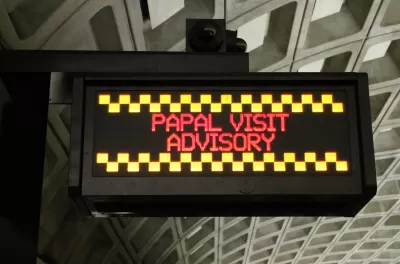Pope Francis' much-publicized visit to the capital in late September saw reductions in congestion and better travel times. Event-specific telecommuting policies and transit route changes appear responsible for the minor miracle.

Against all intuition, Pope Francis' visit to Washington, D.C. this September resulted in less overall traffic, not more. The region's Transportation Planning Board reported on the statistics.
From the report: "Overall, a modest reduction in traffic volumes led to a significant reduction in congestion and an even larger improvement in travel time reliability on freeways, and transit ridership notably declined for the week."
As for causes, Robert Thomson notes, "The federal Office of Personnel Management asked federal agencies to allow employees to telework, adjust their work hours or take time off. Many other employers also allowed telework and flexible work hours policies."
Thomson goes on, "Other factors may have been involved. Sept. 23 was Yom Kippur, and schools were closed in some jurisdictions. Also, some local transit services reduced or rerouted their buses on the roadways that were most likely to be congested during the visit." In other words, the good traffic was likely a one-time deal.
FULL STORY: What Pope Francis did for D.C. traffic

Maui's Vacation Rental Debate Turns Ugly
Verbal attacks, misinformation campaigns and fistfights plague a high-stakes debate to convert thousands of vacation rentals into long-term housing.

Planetizen Federal Action Tracker
A weekly monitor of how Trump’s orders and actions are impacting planners and planning in America.

Chicago’s Ghost Rails
Just beneath the surface of the modern city lie the remnants of its expansive early 20th-century streetcar system.

Bend, Oregon Zoning Reforms Prioritize Small-Scale Housing
The city altered its zoning code to allow multi-family housing and eliminated parking mandates citywide.

Amtrak Cutting Jobs, Funding to High-Speed Rail
The agency plans to cut 10 percent of its workforce and has confirmed it will not fund new high-speed rail projects.

LA Denies Basic Services to Unhoused Residents
The city has repeatedly failed to respond to requests for trash pickup at encampment sites, and eliminated a program that provided mobile showers and toilets.
Urban Design for Planners 1: Software Tools
This six-course series explores essential urban design concepts using open source software and equips planners with the tools they need to participate fully in the urban design process.
Planning for Universal Design
Learn the tools for implementing Universal Design in planning regulations.
planning NEXT
Appalachian Highlands Housing Partners
Mpact (founded as Rail~Volution)
City of Camden Redevelopment Agency
City of Astoria
City of Portland
City of Laramie





























